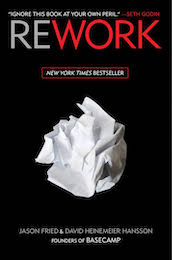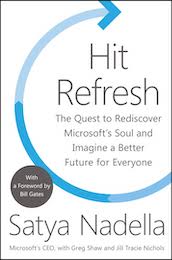My year 2018 in books
For the last ~15 months I spent a lot of wasted time (commuting to work, waiting at the doctors, sitting on planes) with audio books. I have never been a big reader and the entry barrier to start listening to a book instead of music is a lot lower than packing books, reading instead of listening etc. That’s why I became a really big fan of listening to various audiobooks.
Years ago I listened to a lot of books by Andreas Eschbach which I still love for their amazing worlds that are somewhat SciFi but also very realistic. They do not build an entire new civilization with new kinds of lifeforms, instead they alter one tiny detail e.g. humans mastered nano robots or growing oil from bacteria. My all time favorite is Lord of all things [not a referral].
Motivation
Over the last months I mainly listened to audiobooks for learning instead of entertainment. I focus on the following areas:
- team culture
- leadership in tech
- entrepreneurship / innovation
- biographies of interesting (IT) people
- impact of tech on ethics and social norms
As most people do, after getting new ideas from many books I like to talk with friends and colleagues what I would like to change in my life according to the things I just learned. In this blog series I want to share these ideas with you. My goal is not to provide a book review per-se but to share the things that are the major learnings for me personally.
My books in 2018
I will kick off this series with an overview of the books I went through in 2018 and late 2017. Since I did not keep notes on all the books some might only have very short opinion on it.
Elon Musk: How the Billionaire CEO of SpaceX and Tesla is Shaping our Future
by Ashlee Vance 
After the hype around SpaceX Falcon launch I wanted to learn more about Elon Musk - especially his past and how he got to the point where he runs several big firms with an incredible impact on humanity. This biography does a good job at this and also claims to be the only one that actually got Musk to give info/feedback about his biography.
The book starts off with Musks youth in South Africa and eventually tells the story of his first entrepreneurial steps with Zip2 something that could have been google maps and his online payment startup that - by selling it - allowed him to start Tesla Inc.
There is a great blog post out there trying to give an explanation on Elon Musks overall strategy when it comes to his various companies. It gives far better food for thought than the biography I read - altough the bio is great to get more insights on his early years.
Rework
by Jason Fried & David Heinemeier Hansson 
This book is packed with tips for entrepreneurs. In my opinion the advice given in this book is very thorough but only fits for a specific kind of enterprise - those that are similar to Davids own Basecamp.
My main take away from this book is the benefit of having a simple product. Besides the product and its codebase being easier to maintain a simple product also means onboarding new customers is easy because they do not have to jump through many hoops to get the product into use.
1. Simple products lead to happy customers
The more complex your product the harder it is to describe what it does. This may lead to miscommunication with (new) customers that get a product that does not fully meet their expectations. The simpler your product the easier to understand is it for its users. This already shows one limitation of the range of products these tips can be applied to; the aspect of clarity of product specification is relevant if you are in a B2C environment and people need to learn about your product in a self guided manner. If you work in B2B scenarios this aspect might not be as relevant because you have less customers to provide information to and can therefore use marketing and sales people to help with targeted customer communication.
2. Diversity kills product focus
Keep your product simple and do not add features that might blend into another product. Similar to the onboarding benefit of having a simple product, having a confined set of features and use cases makes sure you have a homogenous customer base. This makes it easier to keep those customers happy as they all expect your product to do the same thing. If you change something it is likely that all users take the change equally positive/negative.
One example for failing this rule is Microsoft’s Excel. From high schoolers to soccer moms to professional accountants to data scientists - everyone uses Excel for many different purposes expecting the product to be able to do different things. Excel does a pretty good job at it but managing changes to such a product must be an incredibly complex job. You definitely do not want this complexity in your startup.
3. Ignore 80% of the feature requests
Of course it is important to listen to your users. But to keep your product simple you should put a lot of thought into which features you bring out. A simple rule is prioritize feedback by frequency not by volume. Add features that most of your customers want - not the ones that few people scream for very loudly. This is a tough principle to follow as it might lead to losing customers.
If you have a customer that makes up a significant amount of revenue you need to carefully consider if you can afford losing them for the sake of simplicity. If your startup is still in its growth phase it might be acceptable to lose larger customers.
Alibaba: The house that Jack Ma built
by Duncan Clark 
After learning about the CEO of Tesla and Microsoft I decided to take a peek at the other side of the globe and binged the biography of Alibabas CEO Jack Ma. Before listening to this book I thought I was somewhat aware of the size of the Ali empire; but I was wrong. This book starts off by detailing Alibabas birth and how Jack Ma never sought to compete with Amazon or eBay (B2C) but instead focus on the B2B market to offer a marketplace to the diverse and growing manufacturing industry in China. It is exciting to hear how the different branches of his empire strategically fit together and I really regret not taking more notes on this.
Highlights from 2017
Hit Refresh
by Satya Nadella 
A great book to learn about the cultural transformation at Microsoft that happened over the last ~10 years. Satya elaborates about how he pushes for diversity in various fields to come to the best possible decisions and products. This includes Microsofts push towards becoming more involved in Open Source as the amount of creativity and pure manpower in the Open Source world is huge - even when compared with a company like Microsoft.
Weapons of Math Destruction
by Cathy O'Neil 
This book takes a look at the risks of AI. Not in the Terminator Doomsday kind but the very real risks we already have to consider - but often ignore - today. The main point made in the book is that people too often think results given by machines are objective and do not realize they too are subject to prejudice and bias. It is very important to clearly differentiate at this point. The machine itself is objective in what it does, but the person operating the machine is not. Therefore it is important to pay close attention to how AI results were achieved.
- What was the training set?
- Was the validation set large and independent enough?
- Are we aware of existing biases in the training data that might influence the result, e.g. demographic of a region
- Is the score function vulnerable to biases?
The book does not ask to ablish AI but to be more aware of the results and to trust facts over data.
The Phoenix Project
by Gene Kim, Kevin Behr & George Spafford 
A must read for everyone involved in IT and uses buzzwords like DevOps - especially managers. This novel is easy to read and follows the journey of a classic IT manager into the world of DevOps. Several chapters explain how changes in manufactoring (e.g. Kanban or Kaizen) are comparable to the DevOps movement in IT and thereby also help traditional manufacturing managers to better understand the world of IT. I do not want to write another post about the impact of DevOps but if you are interested in digital transformation I can highly recommend this great book.
The most notable quote might be The Three Ways that keep getting repeated when it comes to managing IT projects:
- The First Way helps us understand how to create fast flow of work as it moves from Development into IT Operations, because that’s what’s between the business and the customer.
- The Second Way shows us how to shorten and amplify feedback loops, so we can fix quality at the source and avoid rework.
- The Third Way shows us how to create a culture that simultaneously fosters experimentation, learning from failure, and understanding that repetition and practice are the prerequisites to mastery.
An explanation of the ways can be found in this blog post by the Author Gene Kim.
Upcoming
I will publish posts on the following books I also read in 2018 soon:
- Powerful talking about things I take from Netflix’ culture that are easy to apply
- How Google works focusing on how to hire and build a great team Update: 2019-01-31 published
It was great to think back to all those books and I hope it will be as fun for future books. Please let me know what you think about the books or any recommendations you have for me in the comments or on Twitter.
